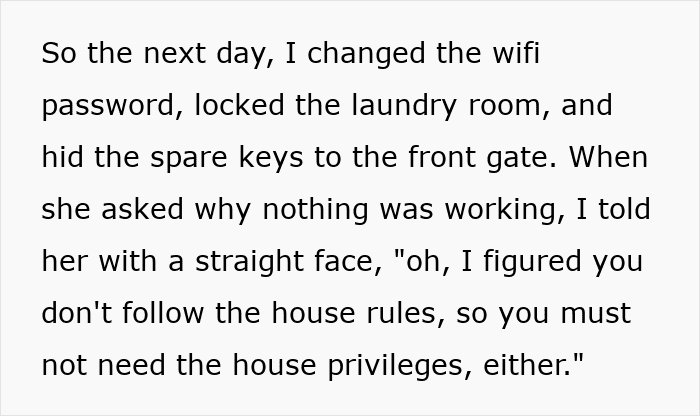There are two types of houseguests: the kind who respect your space and the kind who act like they own it.
This woman’s sister-in-law was definitely the latter. She moved in temporarily, agreed to a few basic rules—don’t smoke inside, keep the noise down, clean up after yourself—and then ignored every single one.
So the host decided she’d had enough and pulled a perfectly petty move that turned her sister-in-law from a total menace into Cinderella.
Read on to see how it all went down.
RELATED:The woman agreed to temporarily let her sister-in-law crash at her place

Image credits: odua / freepik (not the actual photo)
But when she turned it into a mess, it was time to remind her whose house it was




Image credits: EyeEm / freepik (not the actual photo)



Image credits: Pressmaster / envatoelements (not the actual photo)

How to be a wonderful and memorable house guest

Image credits: odua / freepik (not the actual photo)
We often talk about the art of being a great host. We admire people who can make any gathering feel special or turn their home into a welcoming retreat for guests.
But maybe we should spend a bit more time appreciating another skill—being a great guest. Because, as this story shows, not everyone gets it right.
In fact, according to one poll, 91% of Americans who’ve told their guests to “make themselves at home” ended up regretting it. The more you know.
So while basic courtesy should be a given, it clearly isn’t always. Which raises the question: How do you actually be a wonderful guest? Besides, of course, not trashing the place, how do you go above and beyond and leave a good impression?
TV host and travel expert Samantha Brown has some excellent advice.
First, let’s cover the basics. Remember that you’re not staying at a hotel. That means being mindful of the noise and the mess you make. Don’t leave things lying around or expect someone else to clean up after you.
Another tip? Be more flexible than demanding. Staying in someone else’s home may not be as convenient or comfortable as your own. If there are specific things you like or need, say, certain toiletries, it’s best to bring them yourself rather than expect your host to provide them.
Also, take the time to understand the house rules. Every household is different, and small customs can vary a lot. Don’t wait to be told—ask.
“Are they a shoe-less household? Are they strict with how they sort their trash? Do they prefer toilet lids down or up? Just be mindful!” Brown says.

Image credits: Wavebreak Media / freepik (not the actual photo)
One small detail that can make a big difference is simply communicating your plans. Let your hosts know when you’ll be arriving and, just as importantly, when you plan to leave.
Brown emphasizes how helpful this can be, and I completely agree. The end of a stay can be awkward when no one wants to be the first to bring it up. You don’t want to seem rude, they don’t want to rush you, and suddenly things get weird and unclear. But by setting expectations up front, everyone has more peace of mind.
If you have any food allergies or dietary restrictions, speak up early to avoid awkwardness or health issues. And if your diet is particularly strict, it’s a good idea to bring a few of your own snacks so you’re not putting too much pressure on your host.
Another thoughtful gesture is bringing something to share. And no, it doesn’t have to be something you cooked.
“It could be a great hunk of cheese or a good bottle of wine. Or a really fun game you know how to organize. Share some things you like with your hosts and let them get to know you better. Better yet, ask them if they’d like anything from where you’re coming from! Everyone always wants bagels from Brooklyn,” she says.
It’s always a good idea to offer help with cleaning, but there are thoughtful ways to go a step further and make a lasting impression.
Brown, for example, suggests offering to strip the bed sheets when you leave after an overnight stay. Most hosts will wash them anyway, so it’s a small gesture that shows you’re considerate and mindful of their effort.
Lastly, let your host know if you’re having a good time. Hosting can be stressful, and a little reassurance goes a long way.
“Most hosts who care will always be a little worried you’re not enjoying yourself in their home. I always tell them how lovely everything is and how great of a host they’re being!” says Samantha.
Many readers loved the perfectly petty revenge




























Others, however, thought it may have gone a step too far

